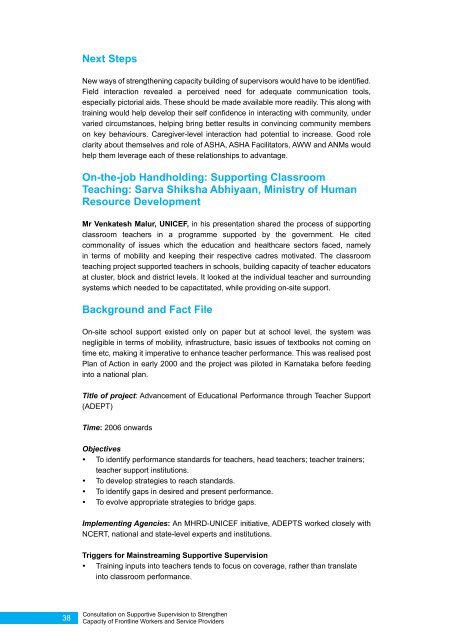Download the complete report - Unicef
Download the complete report - Unicef
Download the complete report - Unicef
Create successful ePaper yourself
Turn your PDF publications into a flip-book with our unique Google optimized e-Paper software.
Next Steps<br />
New ways of streng<strong>the</strong>ning capacity building of supervisors would have to be identified.<br />
Field interaction revealed a perceived need for adequate communication tools,<br />
especially pictorial aids. These should be made available more readily. This along with<br />
training would help develop <strong>the</strong>ir self confidence in interacting with community, under<br />
varied circumstances, helping bring better results in convincing community members<br />
on key behaviours. Caregiver-level interaction had potential to increase. Good role<br />
clarity about <strong>the</strong>mselves and role of ASHA, ASHA Facilitators, AWW and ANMs would<br />
help <strong>the</strong>m leverage each of <strong>the</strong>se relationships to advantage.<br />
On-<strong>the</strong>-job Handholding: Supporting Classroom<br />
Teaching: Sarva Shiksha Abhiyaan, Ministry of Human<br />
Resource Development<br />
Mr Venkatesh Malur, UNICEF, in his presentation shared <strong>the</strong> process of supporting<br />
classroom teachers in a programme supported by <strong>the</strong> government. He cited<br />
commonality of issues which <strong>the</strong> education and healthcare sectors faced, namely<br />
in terms of mobility and keeping <strong>the</strong>ir respective cadres motivated. The classroom<br />
teaching project supported teachers in schools, building capacity of teacher educators<br />
at cluster, block and district levels. It looked at <strong>the</strong> individual teacher and surrounding<br />
systems which needed to be capactitated, while providing on-site support.<br />
Background and Fact File<br />
On-site school support existed only on paper but at school level, <strong>the</strong> system was<br />
negligible in terms of mobility, infrastructure, basic issues of textbooks not coming on<br />
time etc, making it imperative to enhance teacher performance. This was realised post<br />
Plan of Action in early 2000 and <strong>the</strong> project was piloted in Karnataka before feeding<br />
into a national plan.<br />
Title of project: Advancement of Educational Performance through Teacher Support<br />
(ADEPT)<br />
Time: 2006 onwards<br />
Objectives<br />
• y To identify performance standards for teachers, head teachers; teacher trainers;<br />
teacher support institutions.<br />
• y To develop strategies to reach standards.<br />
• y To identify gaps in desired and present performance.<br />
• y To evolve appropriate strategies to bridge gaps.<br />
Implementing Agencies: An MHRD-UNICEF initiative, ADEPTS worked closely with<br />
NCERT, national and state-level experts and institutions.<br />
Triggers for Mainstreaming Supportive Supervision<br />
• y Training inputs into teachers tends to focus on coverage, ra<strong>the</strong>r than translate<br />
into classroom performance.<br />
38<br />
Consultation on Supportive Supervision to Streng<strong>the</strong>n<br />
Capacity of Frontline Workers and Service Providers

















